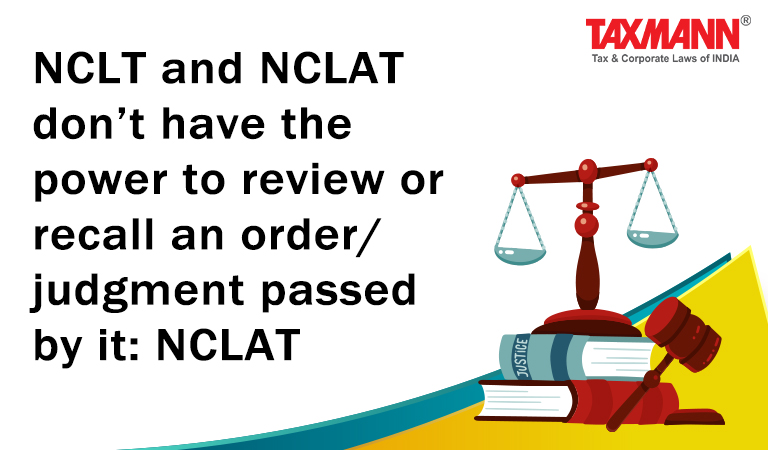NCLT and NCLAT don’t have the power to review or recall an order/judgment passed by it: NCLAT
- Blog|News|Insolvency and Bankruptcy Code|
- 3 Min Read
- By Taxmann
- |
- Last Updated on 12 February, 2026

Case Details: Agarwal Coal Corporation (P.) Ltd. v. Sun Paper Mill Ltd - [2022] 134 taxmann.com 181 (NCL-AT)
Judiciary and Counsel Details
-
- M. Venugopal, Actg. Chairperson | V.P. Singh and Dr. Ashok Kumar Mishra, Technical Member
- V.N. Dubey, Amit Dubey, Rohit Dubey, Advs. and Alam Khan, PCS for the Appellant.
- E. Om Prakash, Sr. Adv., Ms. Madhusmita Bora and G. Ashokpathy and Ms.Pratishtha Vij, Advs. for the Respondent.
Facts of the Case
In the instant case, the applicant’s (operational creditor) claim was allowed to a sum of Rs. 2,173 as against the claim of Rs. 2,39,33,935 before the Resolution Professional. The applicant preferred an application on the file of the NCLT against the rejection of its claim and the aforesaid application was dismissed. Subsequently, the applicant preferred an appeal before the NCLAT, against the said dismissal and the same also came to be dismissed.
The Operational Creditor filed an instant application praying for an exercise of inherent powers by the ‘Tribunal’ and to recall the order passed on the ground of ‘fraud’ played by the respondents. Apart from this, relief was sought by the ”applicant” for setting down the appeal for a ‘hearing’ on its merits.
NCLAT stated that it must be borne in mind that the ”power of review” is a creature of Statute and it is not an ‘inherent power’ as per the decision of the Supreme Court in Lily Thomas v. Union of India AIR 2000 SC 1650. Tribunal further observed that “Review” is not an ‘Appeal’ in disguise.
“No wonder, a reappraisal of evidence on record for unearthing an error will amount to an exercise of ‘Appellate Jurisdiction” which is not permitted in Law. A ”Review” is not to be sought for a ‘Fresh Hearing’ or ‘Arguments’ or ‘Correction of an erroneous view’ taken earlier.” Said the Appellate Tribunal
NCLAT Held
NCLAT stated that it was the well laid down proposition of law that ‘in the absence of any power of ‘Review’ or ‘Recall’ vested with the ‘Adjudicating Authority’ – ‘Appellate Authority, an order/judgment passed by it cannot be either reviewed or recalled as opined by the Tribunal.
Therefore, it is crystalline and clear that the judgment passed by the Tribunal in Comp. Appl. between the parties inter se has become ‘conclusive’, ‘final’ and ‘binding’. Moreover, the applicant cannot fall back upon rule 11 of the NCLAT Rules, 2016 which provides for “inherent powers”. In fact, rule 11 is not a substantive rule which showers any power or jurisdiction upon the ”Tribunal”. Undoubtedly, the ‘Tribunal” has no power to perform an act that is prohibited by Law.
Dismissing the instant application, the NCLAT held that recalling of judgment passed by Appellate Tribunal is impermissible in law. An appropriate course of action open to the applicant was to approach Supreme Court under section 62 against the said judgment if it so desired.
Case Review
-
- Agarwal Coal Corpn. (P.) Ltd. v. Sun Paper Mill Ltd. [2022] 134 taxmannn.com 181 (NCLAT – New Delhi) (para 32) affirmed [See Annex].
- Patel Narshi Thakershi v. Pradyumansingji Arjunsinji AIR 1970 SC 1273 (para 26)
- Sharada Bai v. Padamlal 2003 AI HC 1756 (AP) (para 26) followed.
List of Cases Referred to
-
- K.N. Raj Kumar v. V. Nagarajan [2021] 130 taxmann.com 254 (SC) (para 17)
- Lily Thomas v. Union of India AIR 2000 SC 1650 (para 25)
- Jiura Oraon v. State of Jharkhand 2014 (3) JCR 100 (Jhar.) (para 25)
- Sharada Bai v. Padamlal 2003 AIHC 1756 (AP) (para 26)
- Patel Narshi Thakershi v. Pradyumansinghji Arjunsinghji AIR 1970 SC 1273 (para 26).
Disclaimer: The content/information published on the website is only for general information of the user and shall not be construed as legal advice. While the Taxmann has exercised reasonable efforts to ensure the veracity of information/content published, Taxmann shall be under no liability in any manner whatsoever for incorrect information, if any.

Taxmann Publications has a dedicated in-house Research & Editorial Team. This team consists of a team of Chartered Accountants, Company Secretaries, and Lawyers. This team works under the guidance and supervision of editor-in-chief Mr Rakesh Bhargava.
The Research and Editorial Team is responsible for developing reliable and accurate content for the readers. The team follows the six-sigma approach to achieve the benchmark of zero error in its publications and research platforms. The team ensures that the following publication guidelines are thoroughly followed while developing the content:
- The statutory material is obtained only from the authorized and reliable sources
- All the latest developments in the judicial and legislative fields are covered
- Prepare the analytical write-ups on current, controversial, and important issues to help the readers to understand the concept and its implications
- Every content published by Taxmann is complete, accurate and lucid
- All evidence-based statements are supported with proper reference to Section, Circular No., Notification No. or citations
- The golden rules of grammar, style and consistency are thoroughly followed
- Font and size that’s easy to read and remain consistent across all imprint and digital publications are applied



 CA | CS | CMA
CA | CS | CMA
